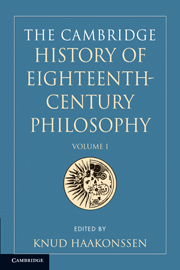Book contents
- Frontmatter
- CONTENTS
- Preface
- Methods of reference and abbreviations
- List of contributors
- I The Concept of Eighteenth-Century Philosophy
- II The Science of Human Nature
- 7 Philosophical Methods
- 8 Human Nature
- 9 Perception and Ideas, Judgement
- 10 Self-Consciousness and Personal Identity
- 11 Reason
- 12 Substances and Modes, Space and Time
- 13 Causality
- 14 Knowledge and Belief
- 15 Scepticism
- 16 Philosophy of Language
- 17 Rhetoric
- 18 Aesthetics
- 19 The Active Powers
- 20 Education
- Biobibliographical Appendix
- Bibliography
- References
12 - Substances and Modes, Space and Time
from II - The Science of Human Nature
Published online by Cambridge University Press: 28 March 2008
- Frontmatter
- CONTENTS
- Preface
- Methods of reference and abbreviations
- List of contributors
- I The Concept of Eighteenth-Century Philosophy
- II The Science of Human Nature
- 7 Philosophical Methods
- 8 Human Nature
- 9 Perception and Ideas, Judgement
- 10 Self-Consciousness and Personal Identity
- 11 Reason
- 12 Substances and Modes, Space and Time
- 13 Causality
- 14 Knowledge and Belief
- 15 Scepticism
- 16 Philosophy of Language
- 17 Rhetoric
- 18 Aesthetics
- 19 The Active Powers
- 20 Education
- Biobibliographical Appendix
- Bibliography
- References
Summary
Discussion of the nature of substances, their relationships, and their interactions is at the heart of metaphysics. There seems to be no question of metaphysics which is not more or less obviously connected with the problem of substances: knowledge of the world, soul, and God, the relationship of body and soul, the freedom of the will and moral responsibility, the immortality of the soul, and the question of a first cause of being. Eighteenth-century conceptions of substances and modes and of space and time cannot be properly understood without an appreciation of the debates of the seventeenth century, particularly as they related to Descartes’s philosophy.
Starting from an Aristotelian definition, Descartes, in the Meditationes de prima philosophia (1641), understands substance as something existing for itself which cannot be expressed as a predicate of something else. Assuming a methodically understood doubt, he finds in the cogito the epistemological basis of a res cogitans, an immaterial spiritual substance that must be distinguished from the res extensa, which is understood as extensive and movable matter (31). Since all other substances can exist only with the assistance of God, the term ‘substance’ in its strict sense applies only to God, the eternal substance. In the ‘Third Meditation’, even the certainty of the existence of the res cogitans is made to depend on the knowledge of God’s existence.
With Descartes’s new metaphysics, three basic questions are raised which came to dominate further debates concerning the nature and essence of substances. The first is how res cogitans and res extensa are interacting, the second refers to the religious and ethical consequences of the concept of substance, and the third relates to the growing success of physical theory and the experimental sciences, which seem to have no place for Descartes’s theory of innate ideas.
- Type
- Chapter
- Information
- The Cambridge History of Eighteenth-Century Philosophy , pp. 343 - 367Publisher: Cambridge University PressPrint publication year: 2006
References
- 1
- Cited by



